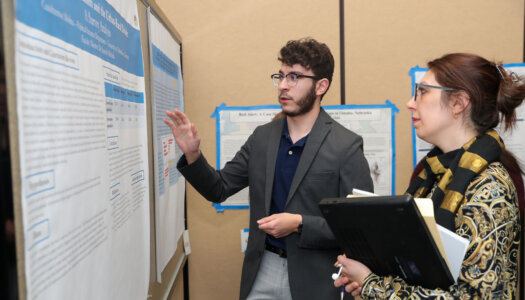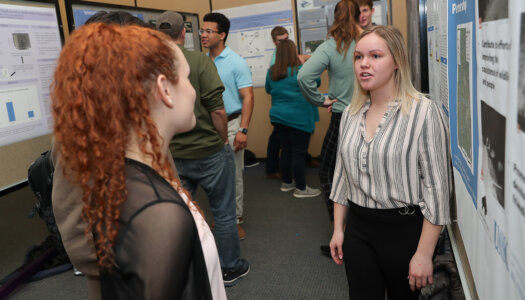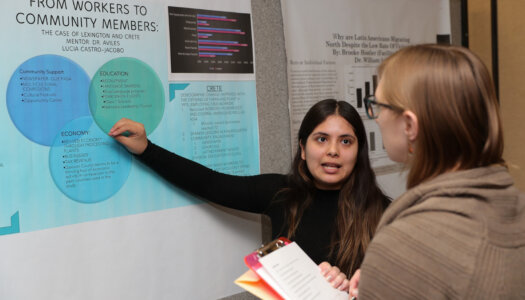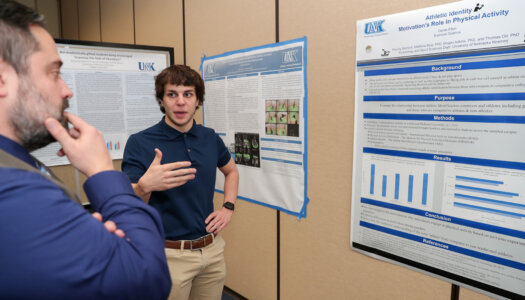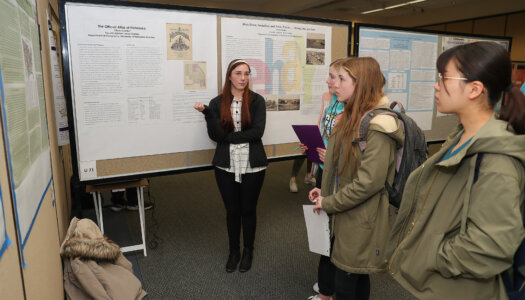
By TYLER ELLYSON
UNK Communications
KEARNEY – The wide range of research conducted by University of Nebraska at Kearney students was on full display Thursday.
Nearly 150 undergraduate students and 30 graduate students presented their creative and scholarly work during the 24th annual Research Day celebration, a campuswide event that highlights the hands-on learning opportunities available at UNK.
Inside the Nebraskan Student Union, participants showcased their projects through oral and poster presentations, giving faculty, peers and other attendees a chance to ask questions and provide feedback.
Dawn Simon, a biology professor and director of undergraduate research and creative activity at UNK, was impressed by the “high-level” research being discussed.
“It’s amazing,” she said. “There are definitely students here who do undergraduate research that’s equivalent to a master’s degree at other institutions.”
In addition to recognizing their accomplishments, Research Day is a way for students to share their hard work, whether they’re studying urban wildlife, TikTok marketing, the history of Nebraska golf or COVID-19’s impact on insurance companies.
“At the end of any scholarly work, you want to disseminate it,” Simon said. “And this is a very friendly environment for them to get practice in that area.”

Audra Kippes, a senior biology major from Hyannis, presented her research on CBD, a chemical compound extracted from cannabis or hemp plants that’s marketed as a treatment for chronic pain, anxiety, inflammation, insomnia, seizures and other ailments. Under the mentorship of assistant biology professor Yipeng Sui, Kippes is looking into potential side effects, specifically a link between long-term CBD use and cardiovascular disease.
A pre-medical student, Kippes joined the Undergraduate Research Fellows program last semester for a variety of reasons. She enjoys working in the lab, her research counts as course credit, it looks good on a resume and she receives a $1,200 annual stipend to pursue projects in her academic field.
“I’ve learned so much working with Dr. Sui,” she said. “I think it’s a great way to enhance your educational experience.”
UNK students who participate in undergraduate research gain a number of skills that translate to any job, including communication, critical thinking, problem-solving and resilience.
“The more experiences they can have like this, the greater their confidence will increase,” Simon said.
“I think research is good for everyone,” she added. “I think all students should try it. No matter if your research project is a resounding success or it doesn’t work at all, you still get those same skills out of it.”
Haley Mazour agrees.
“Even if a student thinks they have a really niche interest, pursue it,” the UNK senior said. “There’s so much information in the world that our professors don’t have time to teach us in class, and I think research is a really amazing opportunity to explore the topics that speak to you.”
A political science major from Hastings, she’s been conducting research with professor Joan Blauwkamp since fall 2019, focusing on the intersection of religion and politics and how they influence each other.
“It’s been an overwhelmingly positive experience,” Mazour said. “I think a lot of that can be attributed to Dr. Blauwkamp. She is absolutely fantastic, not only as a research mentor but also as someone who provides guidance for other women in political science.”
Mazour believes undergraduate research gives students a sense of ownership and helps them better understand course materials. She designed her own survey last semester and presented the results during Research Day.
“Since I’ve been conducting my own research, other people’s research makes a lot more sense,” Mazour said. “I understand the methods because I’ve literally done the same thing. I think that’s absolutely invaluable. You can’t even put a price on that.”
Research Day is sponsored by the Office of Undergraduate Research and Creative Activity, Division of Research and Office of Graduate Studies and Academic Outreach. In addition to the in-person activities, a special graduate research showcase was hosted online. The event concluded with an awards ceremony.

RESEARCH DAY UNDERGRADUATE AWARD WINNERS
Oral presentations
First – Kiley Anderson (English), “The Poetry and Public Persona of Phillis Wheatley”
Second – Sarah Chandler (Biology), “Bacterial Disease Presence in Hall County, Nebraska Tick Populations”
Third – Trenten Theis (Biology), “Increased Persister Formation in Staphylococcus Aureus Leads to Increased Survival Within a Host”
Wagner Family Writing Awards
First – Tylin Masco (Biology), “Soil Properties, Forage Quality, and Ground Cover Differ Between Native and Restored Prairies”
Second – Elijah Lynch (English), “Shadows of Paradise: Dante’s Muse and Portrait of a Lady on Fire”
Ken W. Nikels Scholarship
Josie Koubek
Poster presentations
Behavioral and social sciences
First – Alexis Chavez Monasterio (Political science), “Why Stop the Violence? The Role of Prison Privatization in the Mexican Drug War”
Second – Shelby Haney (Political science), “Different Communities and their Response to Mask Mandates”
Third – Temo Molina (Political science), “American Nationalism and the Urban-Rural Divide: A Survey Analysis”
Natural and physical sciences
First – Brooke Carlson (Physics, astronomy and engineering), “Pockels Effect in Chiral Molecules”
Second – Audra Kippes (Biology), “Cannabidiol Activates Atherogenic Human Pregnane X Receptor”
Third – Hillary Vaughn (Biology), “Cavitand-Meditated Cross-Photocycloaddition of 3-Arylacrylic Acids”
Professional and applied studies
First – Nathan Slusarski (Kinesiology and sport sciences), “Oral and Maxillofacial Sports-Related Injuries: A Case Study”
Second – Jarin Potts (Kinesiology and sport sciences), “Myofascial Release Therapy’s Effect on Athletic Performance”
Third – Paige Moore (Communication disorders), “Dyslexia in Children and Working Memory”
Third – Baylor Hellmuth (Kinesiology and sport sciences), “Definitions of Success Varies Based on Athletes’ Schedules, Perceptions, and Psychological State”
Fine arts and humanities
First – Rochelle Hazelton (Music, theatre and dance), “Trouser Roles in Nineteenth Century French Opera”
Second – Coleman Riggins (English), “Gender Bias in English Academic Writing”
Third – Gabrielle Onate (Art and design), “Those Who Stay & Those Who Go, the Emigration of Nebraska’s Youth”

